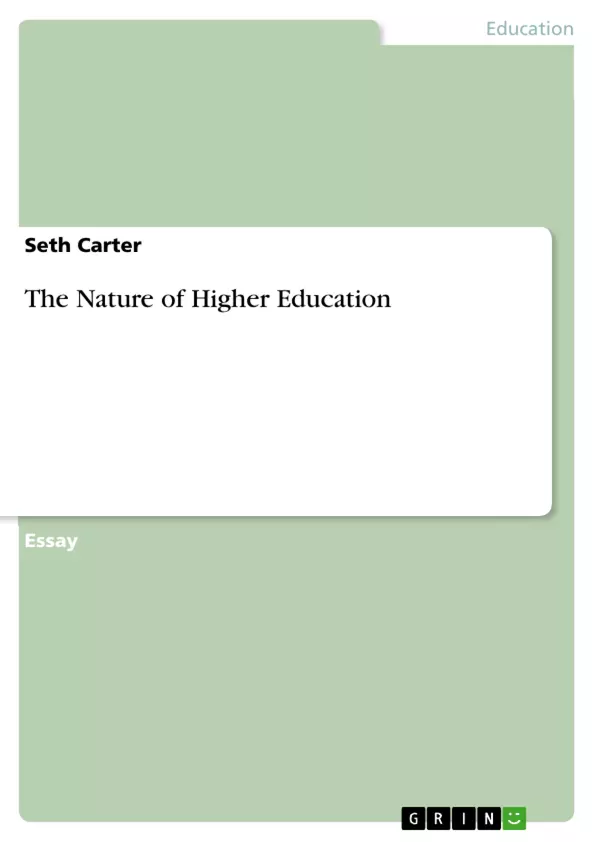This essay is premised on the supposition that many of the foundational disagreements on the role of higher education in American society can be synthesized into three major themes: whether college education is a privilege or right, whether college education is a predominantly public or private good, and who or what benefits the most from the traditional college education. This essay attempts to outline a coherent conception of education that encompasses three themes and ultimately concludes that education is most effectively and fully to be understood as a largely private privilege for the individual with potentially positive public externalities if of a particular type and distribution. Potential counterarguments and insight into the theoretical shortcomings of considering higher education a public right in its diversity are presented and expounded upon.
Inhaltsverzeichnis (Table of Contents)
- Introduction
- Background
- Privilege
- Private
- Individual
- Counterargument and Rebuttal
- Conclusion
Zielsetzung und Themenschwerpunkte (Objectives and Key Themes)
This essay argues that traditional college education is best understood as a private privilege that benefits individuals rather than a public right. It examines the complex economic, social, and cultural facets of higher education in a diverse and modern world, focusing on the philosophical foundation of traditional liberal arts education and its implications for society.
- The nature of higher education as a privilege versus a right.
- The distinction between public and private benefits of higher education.
- The role of the individual in receiving and utilizing higher education.
- The importance of understanding the philosophical foundation of higher education.
- The implications of higher education for society.
Zusammenfassung der Kapitel (Chapter Summaries)
- Introduction: This section establishes the central argument of the essay: traditional college education is a privilege, not a right, and primarily benefits individuals rather than society at large.
- Background: This chapter provides a foundation for the argument by defining key terms, such as "right," "privilege," "positive," and "normative," and emphasizing the importance of understanding the philosophical underpinnings of higher education.
- Privilege: This chapter explores the argument that a college education is a privilege rather than a right, drawing upon the work of philosopher Tibor Machan. It highlights the non-essential nature of traditional college education for a functioning society and the inherent requirements of societal resources for its existence.
- Private: This section argues that the private benefits of higher education are more empirically demonstrable and essential than the public benefits, citing evidence of increased "tolerance" in society as an example of a widely perceived public value.
Schlüsselwörter (Keywords)
This essay focuses on the nature of higher education, exploring themes of privilege, individual benefits, and the philosophical foundation of traditional liberal arts education. It examines the distinction between public and private goods and the complex economic, social, and cultural implications of higher education for modern society.
Frequently Asked Questions
Is higher education a right or a privilege in the US?
The essay argues that traditional college education is best understood as a private privilege rather than a public right, as it is not essential for a basic functioning society.
Who benefits most from a college education?
The primary beneficiary is the individual student through personal growth and economic opportunities, though society may experience positive secondary effects (externalities).
What is the difference between a public and a private good in education?
A private good benefits the individual consumer, while a public good is non-excludable and benefits society as a whole. The author contends education leans toward being a private good.
What are the philosophical foundations of liberal arts education?
Liberal arts focus on critical thinking and intellectual freedom, which are traditionally viewed as personal pursuits of excellence rather than state-mandated entitlements.
What are the counterarguments to higher education as a right?
The essay suggests that treating it as a right ignores the massive societal resources required and may dilute the traditional quality and purpose of academic pursuit.
- Quote paper
- Seth Carter (Author), 2016, The Nature of Higher Education, Munich, GRIN Verlag, https://www.grin.com/document/371796



